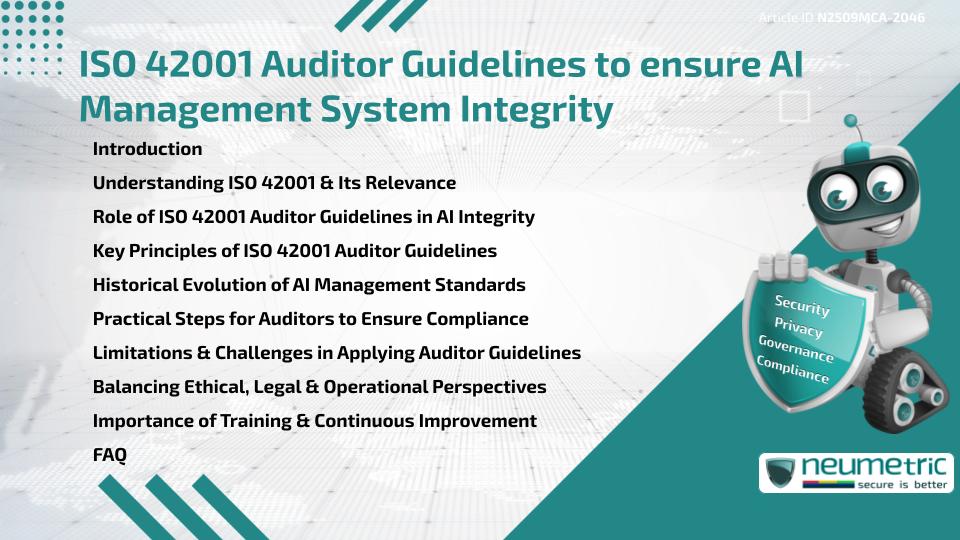Table of Contents
ToggleIntroduction
The rise of Artificial Intelligence [AI] in Business & Governance has created an urgent need for ethical oversight & robust Governance Frameworks. The ISO 42001 Auditor Guidelines provide Organisations with structured approaches to evaluate & ensure that their AI Management Systems operate with Integrity, Fairness & Accountability. These guidelines outline responsibilities for Auditors, emphasize Risk-based Assessment & promote Compliance with Ethical Standards. By following ISO 42001 Auditor Guidelines, Auditors help Organisations maintain Trust, safeguard Data & prevent misuse of AI Systems.
Understanding ISO 42001 & Its Relevance
ISO 42001 is a global Framework designed to help Organisations establish, implement & monitor AI Management Systems. Unlike general IT standards, it is specifically tailored for Artificial Intelligence, ensuring that AI-driven Operations remain Transparent, Secure & Reliable. Adopting this Standard reduces Risks of Bias, enhances Governance & creates Trust among Stakeholders.
For background, see resources such as the International organisation for Standardization & the European Commission on AI.
Role of ISO 42001 Auditor Guidelines in AI Integrity
The ISO 42001 Auditor Guidelines ensure that Organisations do more than adopt Policies on paper. They require practical evaluations of AI Systems in action. Auditors assess Compliance, verify Documentation & examine whether Controls are effectively implemented. This oversight helps prevent errors, unethical practices & operational Risks. Just as Financial Auditors safeguard Cconomic Credibility, AI Auditors strengthen Trust in AI Governance.
Key Principles of ISO 42001 Auditor Guidelines
Several principles guide these Auditor Guidelines:
- Objectivity: Auditors must always be impartial & have conclusions on verifiable Evidence.
- Transparency: Processes must be open to scrutiny, ensuring Stakeholders understand how AI decisions are made.
- Risk-based Assessment: Audits prioritise high-Risk areas where AI may cause harm.
- Continuous Monitoring: Ongoing oversight ensures AI Systems adapt to changing conditions responsibly.
Historical Evolution of AI Management Standards
AI Management standards did not emerge overnight. Earlier Frameworks such as ISO 9001 for Quality Management & ISO 27001 for Information Security influenced the foundation of AI-specific guidelines. Over time, growing concerns around AI bias, Data Privacy & algorithmic Transparency led to the introduction of ISO 42001. Its release represents a significant milestone in aligning AI Governance with international Best Practices.
Practical Steps for Auditors to Ensure Compliance
To apply the ISO 42001 Auditor Guidelines effectively, Auditors should:
- Conduct detailed Risk Assessments of AI algorithms.
- Review organizational Documentation & AI usage Policies.
- Verify compliance with ethical & legal requirements.
- Engage Stakeholders through interviews & process reviews.
- Document Findings & recommend Corrective Measures.
Limitations & Challenges in Applying Auditor Guidelines
Despite their value, ISO 42001 Auditor Guidelines face challenges. Organisations may lack trained Auditors or AI Systems may be too complex for Conventional Assessments. Additionally, cultural differences in interpreting Fairness & Rthics can complicate compliance. These limitations highlight the need for balanced application & ongoing improvement.
Balancing Ethical, Legal & Operational Perspectives
The Integrity of an AI Management System relies on harmonizing ethical considerations with legal compliance & operational goals. While laws define minimum requirements, ethical principles go beyond legality to ensure Fairness & respect for human rights. Operational efficiency must also remain intact to support innovation & Business Objectives. Auditor guidelines provide a structured way to balance these perspectives.
Further reading is available from OECD AI Principles & the UNESCO AI Ethics Recommendation.
Importance of Training & Continuous Improvement
An effective AI Audit is only as strong as the skills of the Auditor. Training Programs help Auditors remain updated on evolving AI technologies, Ethical Standards & regulatory changes. Continuous learning ensures that the Audit process adapts alongside technological advances. Just as doctors undergo regular professional development, Auditors must consistently refine their knowledge base.
Takeaways
- ISO 42001 ensures Accountability in AI Management.
- Auditor guidelines emphasize objectivity, Transparency & Risk-based approaches.
- Historical Quality & Security Frameworks influenced its evolution.
- Practical Audit steps include Risk Assessment, Documentation Review & Stakeholder Engagement.
- Training & ongoing Education are essential for effective Audits.
FAQ
What are ISO 42001 Auditor Guidelines?
They are structured instructions that guide Auditors in evaluating AI Management Systems to ensure compliance, Integrity & ethical oversight.
How do ISO 42001 Auditor Guidelines support AI Governance?
They help identify Risks, enforce Accountability & confirm that Organisations follow legal & ethical requirements in AI use.
Why is auditing important in AI Management?
Auditing prevents misuse, bias & errors in AI Systems while building Stakeholder Trust & ensuring compliance with International Standards.
Are ISO 42001 Auditor Guidelines legally mandatory?
They are not always mandatory but are highly recommended for Organisations seeking Certification & Credibility in AI Governance.
What challenges do Auditors face with these guidelines?
Challenges include the complexity of AI Systems, shortage of trained Auditors & cultural differences in interpreting ethical principles.
Who benefits from applying ISO 42001 Auditor Guidelines?
Organisations, Stakeholders & the Public all benefit from improved Transparency, reduced Risks & greater Trust in AI Systems.
References
- ISO Official Website
- European Commission: AI Policy
- OECD AI Principles
- UNESCO Recommendation on the Ethics of AI
Need help for Security, Privacy, Governance & VAPT?
Neumetric provides organisations the necessary help to achieve their Cybersecurity, Compliance, Governance, Privacy, Certifications & Pentesting needs.
Organisations & Businesses, specifically those which provide SaaS & AI Solutions in the Fintech, BFSI & other regulated sectors, usually need a Cybersecurity Partner for meeting & maintaining the ongoing Security & Privacy needs & requirements of their Enterprise Clients & Privacy conscious Customers.
SOC 2, ISO 27001, ISO 42001, NIST, HIPAA, HECVAT, EU GDPR are some of the Frameworks that are served by Fusion – a SaaS, multimodular, multitenant, centralised, automated, Cybersecurity & Compliance Management system.
Neumetric also provides Expert Services for technical security which covers VAPT for Web Applications, APIs, iOS & Android Mobile Apps, Security Testing for AWS & other Cloud Environments & Cloud Infrastructure & other similar scopes.
Reach out to us by Email or filling out the Contact Form…


